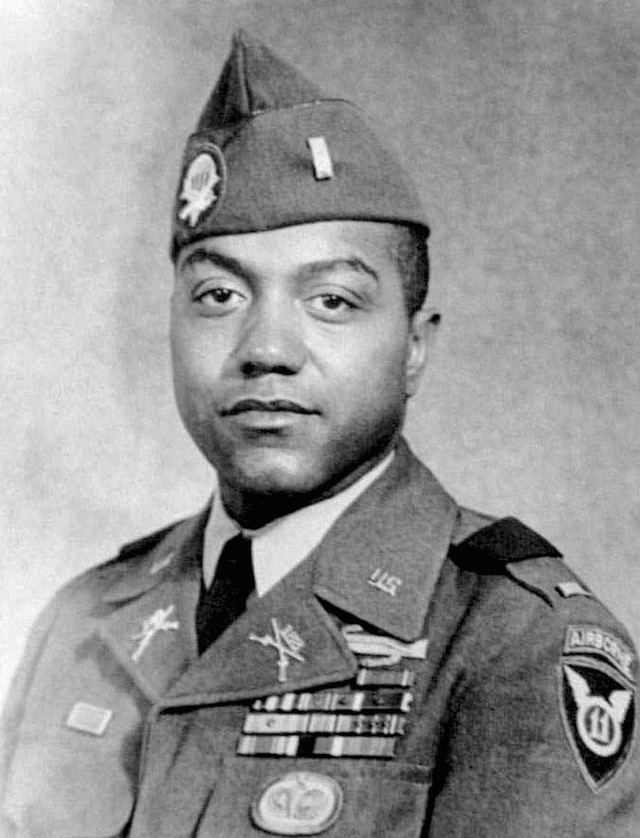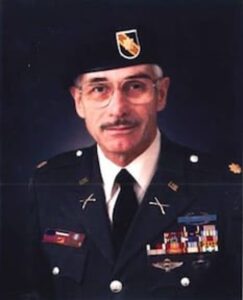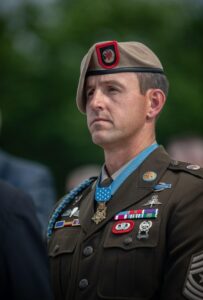Meet Army MOH Recipient Vernon Baker
From an early age, it seemed that Vernon Baker’s life was like that of a phoenix: always rising from the ashes. At every turn, Baker endured hardship. His parents died in a car crash when he was four, and he faced adversity as an African American young man while attending high school in Clarinda, Iowa. Yet he always found ways to push through, to find the positives in each situation.
But the harshest blow came when he tried to enlist in the Army in April 1941. As Baker recalls, the recruiting officer told him he was ineligible to join because “We don’t have any quotas for you people.” Angered and frustrated by the refusal due to the color of his skin, Baker attempted to find work elsewhere. In June, he returned to the office, hoping and praying that the officer wouldn’t be there. A different recruiter welcomed him in and enlisted him in the infantry. Although Baker desperately wanted to be a quartermaster, he didn’t correct the recruiter. “I didn’t say anything because I was going to get in,” Baker later revealed in an interview.
Storming the Italian Castle
On April 5, 1945, First Lieutenant Baker and the 370th Infantry Regiment were stationed by the city of Montignoso, in Italy’s Tuscany region. They were tasked with removing German troops from Castle Aghinolfi. High upon a hill, surrounded by treacherous terrain, the castle was a strong, strategic military position for the Allies. There was only one problem: all previous attempts to capture the castle had ended in deadly failures for American troops.
Baker carefully made his way up the hill, observing his surroundings. First, he neutralized four enemy troops and one camouflaged machine-gun position. Continuing to advance up the steep, narrow path, Baker took out additional enemy troops to make it safe for his fellow comrades to advance. But German fighters discovered the company, and many casualties followed. Making his way back to his troops, Baker removed two more secluded German outposts with hand grenades. In total, he killed nine enemy troops that had been hiding along the trail during 12 hours of intensive combat.
Captain John Rynyon, the company’s commanding officer, called for withdrawal, after realizing reinforcements were not coming to their aid. Baker willingly covered the first group’s uneventful withdrawal. On the second, he knocked out another enemy machine gun post with hand grenades. The next evening, Baker voluntarily led a battalion through minefields and enemy territory. When they reached Castle Aghinolfi, it was empty. Enemy troops had abandoned it, and Baker’s team successfully took over. On July 4, 1945, in Genoa, Italy, he received the Distinguished Service Cross for his daring leadership and brave warfare tactics.
Rectifying a Years-Long Wrong
Baker remained in Italy until 1947. From there, he continued to build a storied military career full of action and danger, and even led an all-white airborne company during the Korean War. He retired in 1968, after serving for 27 years. Baker then found work with the American Red Cross, and remained with the organization for over 20 years.
During a federal investigation in the 1990s, the Department of Defense discovered that nearly zero African Americans had earned or been recognized as Medal of Honor Recipients for their distinguished military service. The highest level of service Black soldiers had previously achieved (outside of the Civil War) was the Distinguished Service Cross. Realizing this grave mistake, Secretary of the Army John Shannon commissioned a study in 1992 to carefully pore over historical documents, including several previously awarded Distinguished Service Crosses. Subsequent reports revealed that seven Black men—including Baker— had been overlooked for Medals of Honor due to racial bias.
On January 13, 1997, Baker received the Medal of Honor from President Bill Clinton during a White House Ceremony. He was the only living African American soldier to receive the Medal, but he was grateful for the recognition, and thankful for the opportunity to rewrite the past. “I feel that the Black soldiers made quite the contribution to winning the war,” Baker commented in a video with The National WWII Museum. “They were wonderful soldiers.”




